
1. Buddhism is an education, not a religion. We do not worship the Buddha, we respect him as a teacher. His teachings enable us to leave suffering and attain happiness.
2. "Buddha" means enlightenment /understanding. Complete understanding is when one realizes the truth about life and the universe. It is when one is apart from all delusions.
3. Cultivation is not something unusual, it is part of our everyday life. Whenever we recognize and correct our faults, we are cultivating.
4. To keep our mind pure and at peace is like keeping a pond clean and undisturbed. When the water is clear and still, it can reflect the sky, sun and trees just as they are, without distortion. When we are polluted by greed, hatred, ignorance and disturbed by discriminations and attachments, we distort our picture of reality and fail to see things as they are. Wrong perceptions of reality can prevent us from enjoying a clear and happy life.
5. What is purity? Purity is apart from defilement. Defilement is the greed, hatred, and stupidity present in our minds. Cultivation is cleansing these impurities from out hearts.
6. The Buddha's teachings should be introduced as an education, not a religion. Using spiritual penetrations and psychic abilities to attract people to believe in Buddhism is not the proper teachings and only serve to mislead others.
7. We should not be afraid to see our faults and mistakes because only then can be corrected. People who fail to see their own mistakes will not be able to change for the better.
8. A student of the Buddha does not just read Buddhist text, he/she studies them to reach a deeper understanding of life and the universe and puts the teachings into practice in everyday life.
9. In putting the teachings into practice, the first thing we should cultivate is the Pure Heart. The Pure Heart is a mind without discrimination or attachments. We must also develop proper understanding by listening to explanations of the Buddha's Teachings.
10. We should treat all people with respect and sincerity. We must be responsible for our actions and careful when handling other's properties. Be conservative with speech and actions to avoid harming others.
11. Filial Piety and Respect are the roots of good conduct.
12. Be considerate and kind in your speech. To put-down another person is only proving your own arrogance and lack of self-confidence to others.
13. To often criticize is not a good matter. We should try to see good points in others.
14. Practicing virtue is to keep a kind heart, speak kind words, and do kind acts to benefit others.
15. The Buddha helps those who have affinity with him. The question of affinity rests in whether the person accepts the Teachings or not. The Buddha's compassion and Teachings extend over all living beings, just as the sun shines evenly over the great earth. Those who hide in the shade cannot receive the benefits of the sunshine, just as those who cover themselves in ignorance cannot benefit from the Buddha's teachings.
16. Don't be jealous of others, you only harm yourself in the process.
17. Wisdom is a must if we truly wish to propagate the Teachings and benefit living beings. Don't use emotions when helping others, use wisdom and be reasonable. If we use emotions when dealing with people and matters, it often makes a good thing go bad.
18. A wise mind is like a mirror, reflecting and perceiving everything clearly without distortion.
19. A student of the Buddha should strictly abide by the laws of the nation, society, moral codes, and discipline himself/ herself in the teachings of the Buddha.
20. To help others is to help yourself.
21. To respect others is to respect yourself.
22. If people would sincerely accrued virtues and practice kind deeds, disaster and calamities can either be reduced or eliminated depending upon the degree of sincerity and kind deeds practiced.
23. The different methods prescribed by the Buddha come from the different needs of living beings. The methods spring forth naturally from the pure, unwavering heart of the Buddha, without the slightest difficulty.
24. The Pure Land method of cultivation is the most difficult to believe and easiest to practice.
25. True virtue and proper conduct are necessary factors on cultivation. If one cannot practice what one preaches, then regardless of how much one knows, they all become useless at the end of his life.
26. Peace of the world is based on peace in the family.
27. Our goal in studying Buddhism and cultivation is to attain complete understanding of life and the universe.
28. Buddhas and Bodhisattvas treat all living beings as they treat themselves. Unlike us, they do not discriminate between themselves and others. Their compassion is equal and they do not ask anything in return for their services.
29. Worries arise from the mind. You are wise if you do not let things worry you. Nothing and nobody can make you worry without your permission.
30. Our heart finds peace when we understand the law of cause and effect; "What goes around, comes around". We would cease to blame others for our own misfortunes because we would be aware of the fact that we brought it upon ourselves. When our heart is at peace, we develop concentration, and with concentration, wisdom comes forth. Wisdom is the key to changing our lives for the better because only with wisdom can we see true reality.
31. If we wish to bring peace to the world, we must start by changing our evil ways. World peace stems from inner peace.
32. We must cleanse ourselves of greed, hatred, and ignorance. These three poisons are the roots behind all our sufferings.
33. True love is undiscriminating, unattached, and unconditional, we should share this love with all beings. This is call compassion.
34. We must learn to "let go" and not be too stubborn with our viewpoints. If this goal can be achieved, then we will be at great ease and live a happy and fulfilling life.
35. Everybody is somebody we can learn from. When we see the virtues of others, we should adopt them as our own. When we see the wrongs of others, we should reflect upon ourselves for the same faults.
36. Love can turn into hate. You may dislike something you adored yesterday. We should see things with eyes of equality and not let emotions control our life.
37. Wise people do not harbour feelings of gain or loss. In this way, they often dwell in the joy of possessing peace of mind.
38. When we encounter a person or a situation we do not like, it is the perfect opportunity for us to practice patience and cultivate a pure and compassionate heart.
39. If we learn to forgive, we will dwell in peace of mind.
40. We should show our gratitude to those who have shown us kindness, such as parents, teachers, and even the society. Everyone in the society is interdependent and inter-related, we should practice good deeds to repay them.
41. Wisdom springs from purity of mind.
42. True cultivation is reciting Amitabha's name in modesty.
43. How many people recognize the kindness shown by parents? Usually, people do not realize until they themselves become parents or lose their parents. We should show our gratitude through practicing filial piety by being responsible, considerate, and obedient to our parents.
44. We should not recite the sutra for the sake of reciting it. We must understand the meaning, put it into practice, and experience the truth.
45. We truly benefit from the Buddha's teachings when it is practiced in everyday life.
46. Wise people do not just see matters from the surface, they contemplate them thoroughly and see the truth.
47. The point of practicing giving and charity is to forsake greed, hatred, ignorance and arrogance.
48. Everything in the Buddha's teachings can be used in everyday life, we should strive to live the teachings and attain true happiness.
49. Everything changes, nothing remains without change.
50. Thousands of candles can be lighted from a single candle, and the life of the candle will not be shartened. Hapiness never decreases by being shared.
51. Hatred never cease by hatred, but by Love







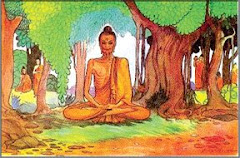





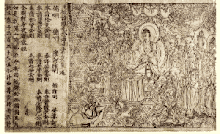
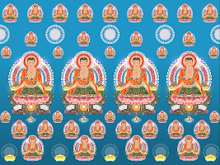

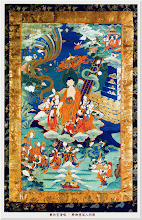

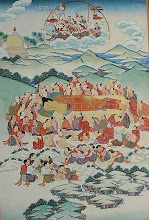


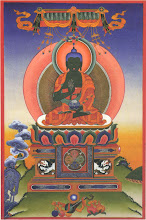




.jpg)

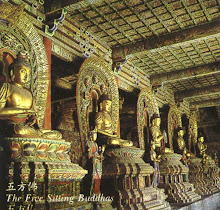

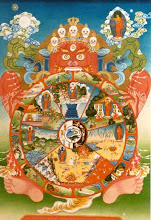


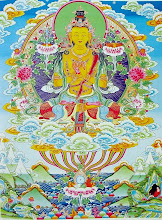








No comments:
Post a Comment